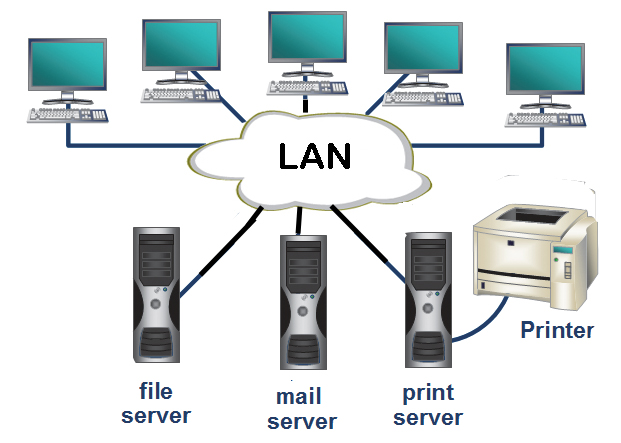What is the full form of LAN
What is the full form of LAN
LAN: Local area network
LAN stands for Local Area Network. A local area network (LAN) is a computer network that interconnects computers within a limited area such as a residence, school, laboratory, university campus or office building.
LANs are generally used to connect personal computers and workstations in company offices to share common resources, like printers, and exchange information. A number of experimental and early commercial LAN technologies were developed in the 1970s.
Ethernet and Wi-Fi are the two most common technologies in use for local area networks. Each device connected to a LAN requires a number or unique address called IP

Advantages of LAN
- Sharing of Resources:
It allows the sharing of costly resources like printers, scanners among all of the computers. Thus, it reduces cost in hardware purch
- Client and server relationship:
All the data from attached computers can be stored in one server. If any computer (Client) needs data then that computer user can simply log in and access the data from the server. For example Images, movies and songs can be stored on the server and can be accessed by any authorized user (Client computer).
- Sharing of the internet:
Local Area Network also provides the facility to share a single internet connection among all the LAN users.
- Software Program Sharing:
You can use single licensed software and any user can use it in the network.
- Easy, Fast, and Time-saving Communication
In LAN computers can exchange data and messages in the easy and fast way. It also saves time and makes our work fast. Every user can share messages and data with any other user on LAN. The user can log in from any computer on the network and access the same data placed on the server.
Disadvantges of LAN
- Data security problem:
If the server computer is not set up correctly and there is a leak in security then unauthorized users can access the data also.
- Server crashes may affect all computers:
If any file on the server is corrupted or hard drive fails then all the attached computers face problems in functioning properly.
- Limitation of distance:
Local area networks are usually made within a building or nearby building and cannot extend to the wider area.
- LAN is expensive:
It is expensive to set up LAN because there is special software required to make a server. Also, communication devices like hubs, switches, routers, cables are costly. The special administrator is required to maintain and troubleshoot LAN for a large office.